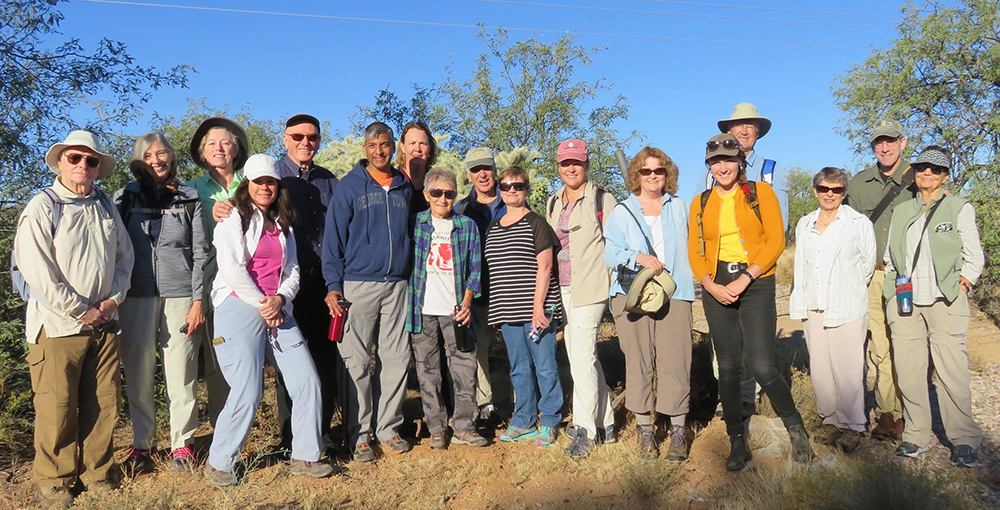
The FPL delegation on the Arizona borderlands. Left to right: Dan Boynton, Janet Boynton, Susan Taylor, Katie Bigelow, Ben Wells, Rev. Manish Mishra-Marzetti, Melissa Brooks (co-founder of the Green Valley Samaritans), Bill Stason, Jeani Welsh, Jillian Darling, Cate Maas, Cy King (Borderlinks facilitator), Peter Pease, Sue Stason, John Snell and Julie Hibben (click image to enlarge).
By Kathy Harvey-Ellis
While immigration issues have been prominent in the news this year, much of the tragedy that occurs at the Arizona/Mexico border can feel removed from Lincoln. For 14 members of the First Parish in Lincoln (FPL) in November, however, the harsh conditions became very real when they traveled to Tucson, Ariz., and the surrounding area to learn about the plight of Latino migrants, the efforts and courage of the humanitarians who help them, and the ways that they personally can contribute to change.
The group, led by the church’s Senior Minister Rev. Manish Mishra-Marzetti, partnered with BorderLinks in Tucson, an organization that uses education to “raise awareness about the impact of border and immigration policies and inspire action for social transformation.” Housed in dormitory-style accommodations, the travelers spent a busy week visiting points along the migrants’ journeys and often dining with guest speakers and humanitarians in the evenings.
Led by the Green Valley Samaritans, a faith-based volunteer organization that delivers humanitarian aid to migrants, the Lincoln delegation hiked the desert, following a route the migrants often take to reach the United States. FPL member Jillian Darling noted the danger they encounter as they travel by night, crossing ground thickly covered with cacti.
The group also headed to the border town of Nogales, a legal port of entry between Arizona and Mexico. There, the FPL parishioners observed surveillance towers manned by U.S. Border Patrol officers and the border wall adorned with crosses and artwork marking the migrants who died there.
“I kept thinking back to the Berlin Wall, and what a difference it made once it came down,” said Darling.
Susan Taylor was taken aback by the border patrol’s military presence. “I expected to see the plight of the migrants. I expected to be moved by that… I did not expect the militarization of the border patrol,” she said.
One of the most poignant visits took place at the federal courthouse in Tucson, where the FPL delegation witnessed the legal process and sentencing of those who have crossed the border without documentation. Herded into the courtroom in a large group “like cattle” as Dan Boynton described it, the migrants were sent back to Mexico or jailed, their only crime being caught at the border.
“The depth of this, the human cost, definitely affected me,” said Taylor. “The setup is so predetermined. You’re caught, that’s it.”
The lives of the Americans living near the border also had an impact on the Lincoln group. “One of the most striking things is how limited financial means there can be, and I’m talking about the American side,” said Rev. Mishra-Marzetti. “It’s modest living there, near the border.”
Boynton was struck by the blatant inequity occurring at the border checkpoints. “There is rampant racism that is part of the border control procedures. There are people who are legitimately American, who happen to have brown skin, who are harassed on a daily basis,” he said.
Rev. Mishra-Marzetti decided to organize the border trip after traveling with a clergy group there in November 2015. Before the 2016 trip, he helped prepare the FPL delegation by teaching a class that explored questions such as the causes of migration and the spiritual and ethical questions surrounding it.
The delegation left the border deeply affected by all they had seen. “I really believe this country should be welcoming to all, and our criminalization of immigrants is a serious issue,” said Darling. “After we came back here, we thought about what our action should look like. We’re so conditioned to give what’s immediately needed. But what does it mean to advocate for fair wages? What does it mean to have their backs?”
On Sunday, Jan. 29 at 11:30 a.m. in the Parish House Auditorium at 14 Bedford Road, members of First Parish in Lincoln’s mission trip delegation will share photos of their trip. The public is invited to attend.
Leave a Reply